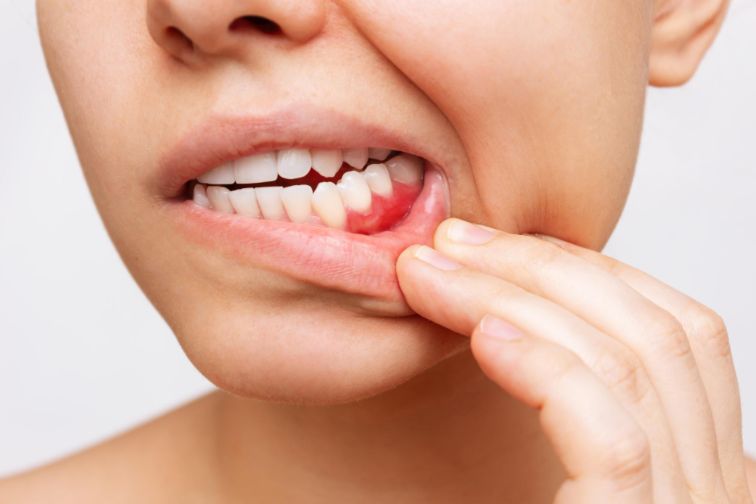Gums are the soft tissue that surrounds the teeth and helps hold them in place. If your gums itch, this may be a sign of bacterial buildup in the spaces between the teeth and gums. Even though the itching may be a minor annoyance, there are cases where the problem is really serious. For example, your teeth may itch if you have a tooth abscess, in which case a root canal treatment is the only option (other than tooth extraction).
It is advised to visit your dentist if your gums are constantly itching, as this can be a serious concern.
There are several symptoms associated with itchy gums, which can help in revealing the cause of the problem. The symptoms may include:

Bad oral hygiene can lead to gum disease, also known as periodontal disease. Itchy gums associated with gum disease can seem insignificant to the swelling and bleeding that occurs.
Injuries to the gums or mouth usually cause discomfort or a tingling sensation. Injuries to the mouth can be a result of physical injuries, such as injuries sustained while playing sports. Behaviours such as teeth grinding can lead to injuries and can cause headaches, itchy gums, and jaw pain.
A sensitivity or allergy to certain things can cause itchy and swollen gums. Some food or oral hygiene products can be the cause of an allergic reaction. The most common causes of an allergic reaction are:
If your dentist recommends an oral care product that irritates your mouth and gums, it is best to visit a medical doctor so he can diagnose what you’re allergic to so you know what to avoid in the future.
Changes in the natural level of your hormones can sometimes cause itchy gums. Women that go through hormonal changes during pregnancy, menstruation, puberty, or menopause may experience itchy gums and can be at a higher risk of getting gum disease. The severity of the itching can be minor or more severe, regardless of oral hygiene.
Plaque is the result of acid-producing bacteria that live on the surface of the teeth and gums. Plaque buildup (gingivitis) can be the first sign of periodontal disease. If too much time passes between brushing and flossing the bacteria can start to irritate the gums, which is one of the first symptoms of gingivitis.
Bruxism, also known as teeth grinding and clenching is a condition where a person unknowingly clenches their teeth because of stress or when they are asleep. The constant friction of clenching the teeth can irritate the gums in areas where the teeth are in direct contact, which causes an itching sensation. Other symptoms of bruxism can include ear pain, jaw or TMJ (temporomandibular joint) pain, or worn teeth.
Ulcers or “canker” sores can be the cause of itchy gums. Ulcers are a type of sore that appears on the inside of the mouth. They can be very painful if they come into contact with food while eating, or while brushing or flossing. Ulcers aren’t a big problem and last for a couple of weeks. However, if they persist longer than a couple of weeks it is recommended to visit your doctor or dentist.
A dry mouth (xerostomia) occurs when not enough saliva is produced to keep the mouth lubricated. This can allow common irritants to irritate your gums and oral mucous membranes more easily. A dry mouth often results in a burning and itching feeling in the mouth. A dry mouth can be easily treated with an increased water intake. Other products such as supplemental moisturizing drops or toothpaste and mouthwash designed for xerostomia can be used to moisturize the mouth if dry mouth persists.
Viral infections can cause itchy or tingling sensations as ulcers start developing. Treating these kinds of sores can be done with over-the-counter prescription antiviral medication, which can shorten the duration of the outbreak.
Dentures and other dental devices that don't fit snugly can cause itching problems. While eating, if there is a gap between the dental device and teeth, food can find its way in. Bacteria can start to grow and an infection may happen. This can cause itchy gums, inflammation, and sensitivity.

There are several ways to treat itchy gums, depending on the cause. Some of them are home remedies and others require a visit to the dentist.
Home remedies are pretty simple but can be very effective when done correctly. The best home remedy is proper dental hygiene. Brushing and flossing your teeth two times per day is vital to good oral health. Brushing and flossing can prevent plaque buildup and inflammation from happening, and when paired with an antiseptic mouthwash can help treat your itching problem very effectively. If you have trouble removing plaque in the tight spaces in your mouth, a water flosser can help.
Other home remedies for itchy teeth can be washing your mouth with salt water or sucking on ice cubes to cool the gums and stop itching. Smoking can irritate your gum and oral health too, so it is advised to quit smoking as this can make the itching stop.
Dental procedures and medicine that can treat itchy gums can be:

